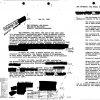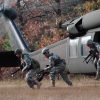calsfoundation@cals.org
Thomas Lewis Lavy (1941–1995)
Thomas L. Lavy was an accused terrorist who committed suicide, hanging himself in his jail cell in Little Rock (Pulaski County) while awaiting trial in December 1995. While his death ended the ongoing investigation, it also left numerous questions as to what he had done and what he had intended to do.
Thomas Lewis Lavy was born on December 18, 1941, in Winfield, Missouri, the second child of Littleton Lavy and Cora Yates Lavy. He was raised in Troy, Missouri, where he received his basic education. Following school, Lavy apparently joined the U.S. Army, although there are questions about the time and nature of his service. While there are reports that he was a military policeman in the Korean War, he was in fact not yet a teenager when the armistice ending the war went into effect in 1953. He likely served in an army unit stationed in Korea at a later point, but neither confirmation of that nor the dates of his service are available.
It appears that his army service was followed by a variety of jobs. He was reported to have worked in the 1970s as a radio repairman for Motorola in Oklahoma City, Oklahoma. He later moved to Valdez, Alaska, where he worked as an electrician for a local oil company. In 1992, while visiting his sister, Betty Krieg, and her husband in Missouri, he spoke of his desire to retire and buy a small plot of land on which he could raise chickens and grow a garden. Later that year, he purchased a small cottage in Arkansas on six acres of land in Onia (Stone County) and the following spring began a trek from Alaska to Onia.
However, as he attempted to enter Canada from Alaska in April 1993, he was stopped when he was discovered to have several firearms, sizeable stores of ammunition, a large amount of ricin poison, and a large amount of cash. Lavy was reported to have said that the poison was to be used to kill coyotes that could threaten chickens on his farm, but it was still confiscated. Lavy did not immediately face charges related to the incident, and in fact, following the confiscation of the ricin, Lavy left Alaska and relocated to Arkansas without incident.
There was nothing in his comparatively brief stay in Onia that would have raised questions, but after the border search, suspicions about Lavy were heightened as a result of unsubstantiated reports indicating that he had ties with “survivalist groups” characterized by local officials as far-right Christian fundamentalists who stored weapons, food, and other supplies in preparation for a cataclysmic war; it was also alleged that Lavy was a white supremacist. These concerns had apparently fueled an ongoing investigation after the 1993 border crossing incident, and on December 12, 1995, Lavy was indicted in Anchorage, Alaska.
He was arrested on December 20 in a raid on his small stone cabin near Onia. The raid on his modest chicken farm was conducted by over thirty agents of the Federal Bureau of Investigation (FBI), as well as a special army unit specializing in biological warfare. While officials found nothing to connect Lavy to terrorist groups, and found no poison, they did find castor beans, from which the poison can be extracted. They also found the book The Poisoner’s Handbook, which lays out how to extract ricin from castor beans, as well as the book Silent Death, which details ways that toxic compounds can be used.
Following his arrest, Lavy was charged with having violated the Biological Weapons Anti-Terrorism Act of 1989. However, the exact nature of his plans was not outlined by the authorities, who sought his return to Alaska to stand trial. At the December 22, 1995, bail hearing, an FBI agent testified that, in a search of Lavy’s car during his 1993 border crossing, officials had discovered $89,000 in cash, four guns, more than 20,000 rounds of ammunition, and a quantity of white powder that subsequent tests showed was ricin. Based on this information, the federal judge denied Lavy bail. With the possibility of a sentence of life imprisonment for the alleged crime, Lavy hanged himself in his Little Rock jail cell on December 23, 1995.
Lavy had married Rebecca Davis in 1960, and the couple had two children, Lewis Edward Lavy and Lisa Lavy Hoelting, both of whom denied their father was a terrorist. Lavy’s attorney, Sam Heuer, asserted that federal officials sought to depict Lavy as someone he was not and that the FBI was overzealous in its pursuit of a man who was a naturalist who enjoyed hunting and gardening.
For additional information:
“Arkansas Man Charged for Transporting Poison.” Washington Post, December 23, 1995. Online at https://www.washingtonpost.com/archive/politics/1995/12/23/arkansas-man-charged-for-transporting-poison/eecd5e61-01e5-4852-aea4-ffb0257910a1/?utm_term=.0b1a55b30a71 (accessed October 5, 2018).
“Biological Weapons Suspect Hangs Himself in Arkansas Jail.” Washington Post, December 24, 1995. Online at https://www.washingtonpost.com/archive/politics/1995/12/24/biological-weapons-suspect-hangs-himself-in-arkansas-jail/cd7ee36c-ca5b-419e-82bc-6d6bdd23a375/?utm_term=.7d3da735e844 (accessed October 5, 2018).
Kifner, John. “Man Arrested in Poison Case Kills Himself in Jail Cell.” New York Times, December 24, 1995. Online at https://www.nytimes.com/1995/12/24/us/man-arrested-in-poison-case-kills-himself-in-jail-cell.html (accessed October 5, 2018).
“Man Accused of Possessing Lethal Toxin Hangs Himself.” Los Angeles Times, December 24, 1995. Online at http://articles.latimes.com/1995-12-24/news/mn-17482_1_ricin-charged-arrest (accessed October 5, 2018).
William H. Pruden III
Ravenscroft School








Comments
No comments on this entry yet.